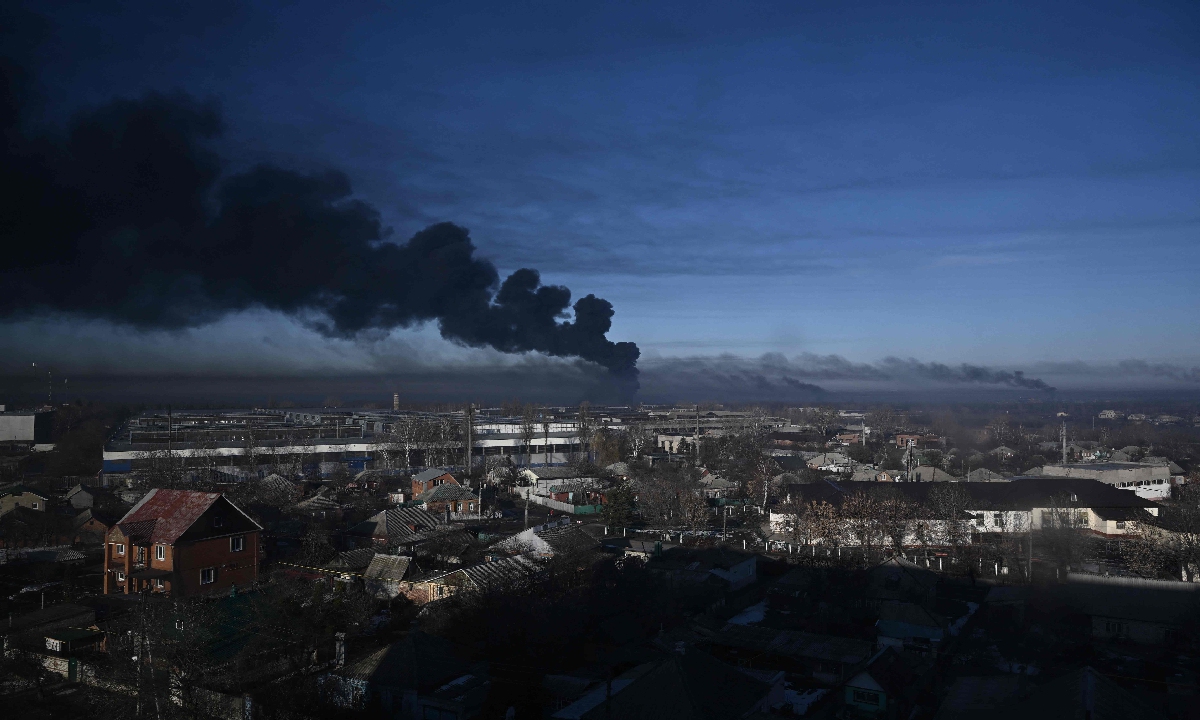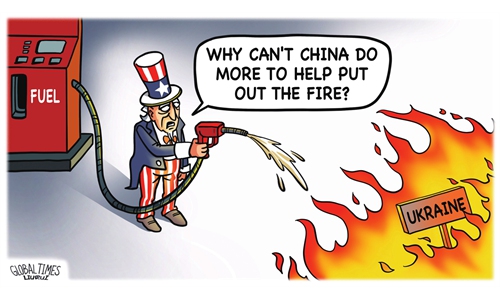China calls on UN actions to be conducive to defusing Ukraine crisis amid public rejection of escalation, 'not to Ukraine'

Photo: CFP
Click here to stay tuned with our live updates on Ukraine tensions.China expressed deep concerns about the latest developments in Ukraine and stressed that faced with a very complex and sensitive situation, the UN Security Council should make a necessary response but the response should also be extremely cautious as any action should be truly conducive to defusing the crisis, rather than adding fuel to the fire, Zhang Jun, China's permanent representative to the United Nations said, explaining why China abstained from voting on a relevant draft resolution.
The UN Security Council on Friday failed to adopt a draft resolution on Ukraine. The draft resolution, proposed by the US and Albania, was rejected because it was vetoed by permanent member Russia. Russia is a Security Council veto power, along with the US, China, France and the UK. Any negative vote, known as veto, from the council's five permanent members means a failed resolution.
China, the United Arab Emirates and India abstained from the vote. The remaining 11 council members voted in favor. The draft resolution is expected to be taken up by the 193-member UN General Assembly.
"China is deeply concerned about the latest developments of the situation in Ukraine. Currently, it has come to the point which we do not want to see. We believe that the sovereignty and territorial integrity of all states should be respected, and that the purposes and principles of the UN Charter should be jointly upheld," Zhang Jun, Permanent Representative of China to the UN, said at the UNSC meeting.
We have always called on all parties to seek reasonable solutions to address each other's concerns through peaceful means on the basis of equality and mutual respect. We welcome and encourage all efforts for a diplomatic solution, and support the Russian Federation and Ukraine in resolving the issue through negotiations, Zhang said.
The Security Council held four meetings on the situation in Ukraine in the past month. The Council met on January 31 at the request of the US. On February 17, Russia organized a briefing to mark the seventh anniversary of the Minsk II agreement of February 12, 2015, which outlined steps for ending the conflict in eastern Ukraine through a political settlement. On February 21, the Council convened for an open meeting at the request of Ukraine, which was followed by Russia's decision to recognize the independence of Donetsk and Luhansk in the Donbas region in eastern Ukraine and an escalation of fighting in and around those areas.
In the evening of February 23, the Council again held a meeting at the request of Ukraine. At that meeting, the US announced that it would table a draft resolution on Ukraine. While the Council was in session, Russia announced the commencement of the "special military operation" in the Donbas region in eastern Ukraine.
"At present, faced with a very complex and sensitive situation, the Security Council should make a necessary response. At the same time, such a response should also be extremely cautious. Any action should be truly conducive to defusing the crisis, rather than adding fuel to fire," Zhang said. "If not properly handled, or blindly exerting pressure and imposing sanctions, it may only lead to more casualties, more property loss, more complicated and chaotic situations, and more difficulties in bridging differences. It may completely shut the door to a peaceful solution, and eventually it is the vast number of innocent people that will be the victims."
We must draw profound lessons from the extremely painful experience in the past. For this reason, China will abstain from voting now, the ambassador said.
Zhang stressed that the issue of Ukraine is not something that only emerged overnight. It is a result of the interplay of various factors over a long period of time.
China advocates the vision of common, comprehensive, cooperative and sustainable security. We believe that one country's security cannot be at the expense of the security of others, and that regional security should not rely on muscling up or even expanding military blocs. The legitimate security concerns of all countries should be respected, said Zhang.
Against the backdrop of five successive rounds of NATO's eastward expansion, Russia's legitimate security aspirations should be given attention and properly addressed. Ukraine should become a bridge between the East and the West, not an outpost for confrontation between major powers, he noted.
In the past a few days, China's stance on the Ukraine issue has been reiterated multiple times via different channels, including President Xi Jinping's phone conversation with Russian President Vladimir Putin. In the phone call, Xi stressed that the Ukraine crisis must be addressed via negotiations.
Ahead of the vote, Chinese State Councilor and Foreign Minister Wang Yi on Friday elaborated China's basic position on the Ukrainian issue during his phone talks with British Foreign Secretary Liz Truss, the European Union's High Representative for Foreign Affairs and Security Policy Josep Borrell as well as Emmanuel Bonne, diplomatic counselor to French President Emmanuel Macron, respectively.
Wang expounded on China's basic position on the Ukrainian issue in five points. He stressed that China's position is consistent and clear and applies equally to the Ukraine issue. The security of one country should not be at the expense of the security of other countries, and regional security should not be guaranteed by strengthening or even expanding military blocs.
"The legitimate security concerns of all countries should be respected. Under the circumstances of NATO's eastward expansion for five consecutive rounds, Russia's legitimate demands for security should be taken seriously and properly addressed," Wang said.
China believes that the UN Security Council should play a constructive role in resolving the Ukraine issue and give priority to regional peace and stability as well as the security of all countries. Actions taken by the Council should cool tensions rather than add fuel to them, and should facilitate a diplomatic solution rather than further escalate the situation. "In view of this, China has always opposed the frequent use of Chapter VII in Security Council resolutions authorizing the use of force and sanctions," Wang explained.
According to Reuters' report, the Council softened the language in its resolution to say it "deplores" Russia's "aggression against Ukraine" from "condemns," while a reference to Chapter VII of the UN Charter, which deals with sanctions and authorization of force, was removed along with a reference to "the president."
What would happen if Chapter VII was authorized in the UN resolution? Yang Jin, an associate research fellow at the Institute of Russian, Eastern European, and Central Asian Studies under the Chinese Academy of Social Sciences, believes the US and NATO fully understand what it means if their troops get involved in the crossfire, and how Russia would interpret such an act. Russia would react fiercely and the consequences would be unimaginable. Any rational UN Security Council member should understand it and handle the issue with caution.
The ethnic, historical complexity of Europe was deeply rooted behind the current crisis. The international society must understand both Ukraine's and Russia's concerns to ensure a constructive, sustainable mechanism to maintain peace and stability, Yang told the Global Times.
"The role China is playing is to communicate with involved parties and push for effective negotiations and dialogue, to deescalate the tensions rather than fanning the flames. That is what a major power loving peace should do and that is what the UN Security Council should do," Yang said.
In March 2011, the Security Council authorized the use of force in Libya against the Al-Qadhafi regime under the Chapter VII, where China, Russia, Brazil, Germany and India abstained.
However, the resolution failed to address the nation's internal conflicts, but turned it into a chronic problem and more than a decade of war, numerous casualties and homeless people, and huge disaster for Libyans, deeply plaguing the region.
A spokesperson for Ukrainian President Volodymyr Zelensky said on late Friday that Ukraine and Russia are continuing consultations regarding the place and time of negotiations about a ceasefire.
Sergiy Nikiforov, the spokesperson of the Ukrainian President, said on Facebook that his country is always ready for a cease-fire, peace and negotiations and denied an earlier Kremlin statement that Ukraine rejected Russia's offer to negotiate.
Opposition to escalation
On Friday, China's Twitter-like Sina Weibo announced that they have punished 74 accounts involving 542 comments in the platform which advocate nasty jokes, and viciously promote opposition between China and Ukraine.
The platform said on Saturday that it has shut down or suspended 105 accounts from publishing information after "a very few netizens were found to have posted offensive and abusive remarks on the Sina Weibo accounts of foreign embassies and institutions, propagating hatred and stirring up war."
Regarding some voices on Chinese social media that mock the US which "played with fire until crossfire," and "support" Russia to teach the US and NATO a lesson amid their strategic squeezing, some Western media hyped such sentiments as Chinese people's "opposition to Ukraine" with ulterior motives.
Li Haidong, a professor at the Institute of International Relations of China Foreign Affairs University, told the Global Times on Saturday that the Chinese people have never "opposed" Ukraine. What China opposes is any escalation to the regional situation.
The Chinese people did not forget that NATO, which owes blood debt in its bombing of the Chinese Embassy in Yugoslavia, and the US, are culprits of the current scenario, Li said, adding that the majority people are sincerely showing empathy to Ukraine, especially the civilians who are suffering.
China has the best record as a major power when it comes to peace and security. We have never invaded other countries, engaged in proxy wars, sought spheres of influence or engaged in military bloc confrontation. It is regretful that a country like Ukraine with rich resources, strong industrial basis and a huge talent reserve failed to maintain neutrality and master its own destiny, Chinese analysts said.


